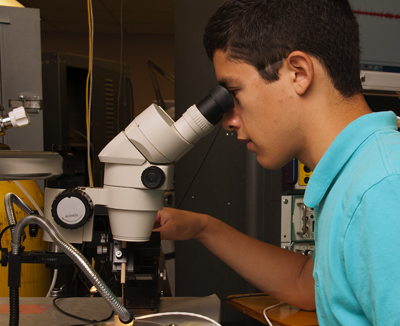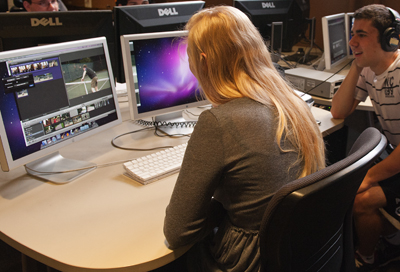Summer Study: What Do Phase II Scholars Do?
Phase II Scholars return to the UW Seattle campus for their second Summer Study. They meet the Phase I Scholars, learn about college life and career preparation, and participate in a one-week workshop with postsecondary instructors.
Germ Forensics
During Summer Study, five Phase I Scholars—Krysta, Nicco, Niki, Shawn, and Eric—spent their mornings learning about global health. This workshop was sponsored by Seattle BioMed, a non-profit dedicated to eradicating diseases in developing countries. The diseases Seattle BioMed focuses on are malaria, tuberculosis, and HIV/AIDS. The students learned how infectious diseases are spread and what is being done to treat and cure them.
We began the week by collecting bacteria samples that we then streaked in petri dishes to be looked at later in the week. We learned how bacteria and viruses attack our immune systems. When we are sick, it's not the virus making us sick but rather, our bodies reacting to the virus. Things like fevers and coughing are all things our bodies do to help kill the foreign cells.
On Wednesday, we took a trip to the Seattle BioMed lab where we used compound microscopes to look at bacteria cultures we collected earlier in the week, dissected mosquitoes, and toured the lab. Our tour guide explained to us the progress Seattle BioMed is making in developing a malaria vaccine. They have a vaccine already in clinical trials!
In addition to all of these things, we learned about how epidemiologists track diseases' origins, how to use micropipettes, and how to conduct ELIAS tests to look for HIV antibodies. We learned a lot about science and how we can make a difference in global health.
We would like to thank our teachers, Beth Solan and Magali Sanchez, and Seattle BioMed for giving us this amazing experience!
Phase II Neurobiology Workshop

During the second week of Summer Study 2011, a group of Phase II Scholars participated in the Bugs, Mice, and Brains workshop. It was hosted at two labs at the University of Washington Medical Center and Kincaid Hall on the UW Campus. At the medical center, Scholars had the chance to complete a junior-level lab for neurobiology majors. This lab used sensitive electronics and amplifiers to measure electrical signals in cockroach neurons. The Scholars manipulated the spines on cockroaches to see how different stimuli can affect a cockroach's reaction and adaptation to the signal.
In the lab at Kinkaid Hall, the Scholars dissected and tested the hindbrain on a mouse embryo. The lab was set up to measure florescence in the embryo tissue. Scholars tested different drugs on the tissue and recorded how it reacted. Each of the workshops gave participants an opportunity to work in two real, functioning science labs and learn how to formulate hypotheses, test them, and draw conclusions from experiments.
Lights, Camera, Action!

Some of the Phase II Scholars enrolled in a class called Lights, Camera, Action! In the class, they worked with high definition video cameras and edited the content using iMovie on Mac computers. Subject matter varied. Some students filmed events that were taking place during the week and then compiled them into one movie. Others made parody commercial segments involving common sodas we drink in our everyday lives. Tivon, the instructor, is from the University of Washington's DXArts program. His knowledge and insight really helped the students make a high quality video.